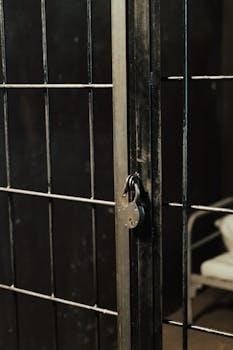Criminal Justice is an interdisciplinary field examining the agencies and processes involved in crime control. It encompasses law enforcement‚ courts‚ and corrections. The field explores crime’s causes‚ consequences‚ and societal responses. It aims to understand and improve the administration of justice‚ ensuring fairness and effectiveness.
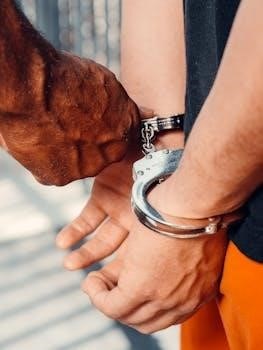
Defining Criminal Justice
Defining criminal justice involves understanding its multifaceted nature. It is a complex system with interconnected components. Criminal justice encompasses the processes‚ institutions‚ and policies aimed at maintaining social order through crime prevention and control.
At its core‚ criminal justice is about enforcing laws and administering punishment. It includes law enforcement agencies‚ courts‚ and correctional facilities. These entities work together‚ albeit with distinct roles‚ to address crime. The definition also extends to the study of crime‚ its causes‚ and its impact on society.
Furthermore‚ criminal justice is a field of academic inquiry. Criminology and related disciplines contribute to its theoretical foundation. This involves examining crime trends‚ analyzing offender behavior‚ and evaluating the effectiveness of interventions.
Ultimately‚ defining criminal justice requires recognizing its dynamic and evolving nature. It is shaped by legal precedents‚ societal values‚ and empirical research. This definition also considers the rights of the accused‚ due process‚ and ethical considerations.
The Structure of the Criminal Justice System
The criminal justice system comprises law enforcement‚ courts‚ and corrections. These components function interdependently to address crime. Law enforcement investigates‚ courts adjudicate‚ and corrections manage offenders. Each plays a vital role in maintaining social order and justice.
Law Enforcement
Law enforcement serves as the initial point of contact within the criminal justice system. Agencies range from local police departments to federal entities like the FBI. Their primary duties include preventing crime‚ investigating offenses‚ and apprehending suspects. Officers enforce laws‚ maintain order‚ and provide community services.
Effective law enforcement relies on training‚ resources‚ and community trust. They must uphold constitutional rights while ensuring public safety. Technological advancements‚ such as data analysis and body-worn cameras‚ are increasingly integrated into policing. Challenges include evolving crime trends‚ resource limitations‚ and maintaining accountability.
Ethical conduct and procedural justice are paramount in law enforcement. Building positive relationships with diverse communities is crucial for effective crime prevention. Modern policing emphasizes problem-solving strategies and community engagement to address the root causes of crime and foster safer neighborhoods.
The Courts
The courts are a critical component of the criminal justice system‚ responsible for adjudicating guilt or innocence. They interpret and apply the law‚ ensuring fair trials and due process. The court system operates at both state and federal levels‚ with varying jurisdictions and procedures.
Key figures in the court system include judges‚ prosecutors‚ and defense attorneys. Judges preside over trials‚ make legal rulings‚ and impose sentences. Prosecutors represent the state‚ presenting evidence against the accused. Defense attorneys advocate for the accused‚ ensuring their rights are protected.
Court processes involve arraignments‚ preliminary hearings‚ trials‚ and appeals. The adversarial system pits the prosecution against the defense‚ seeking to uncover the truth. The courts aim to balance individual rights with public safety‚ resolving disputes and administering justice within legal frameworks.
Corrections
Corrections encompasses the various agencies and programs responsible for managing individuals convicted of criminal offenses. This component of the criminal justice system focuses on punishment‚ rehabilitation‚ and reintegration into society. Corrections systems operate at federal‚ state‚ and local levels‚ each with distinct facilities and policies.
Key elements of corrections include incarceration‚ probation‚ and parole. Incarceration involves confinement in prisons or jails‚ serving as a form of punishment and incapacitation. Probation allows offenders to remain in the community under supervision‚ contingent on compliance with specific conditions. Parole provides early release from prison‚ subject to similar conditions and monitoring.
Correctional goals extend beyond punishment to include rehabilitation. Programs such as education‚ job training‚ and counseling aim to reduce recidivism and promote successful reentry into society. Community-based corrections offer alternatives to incarceration‚ fostering local support and resources for offenders. The effectiveness and ethics of correctional practices remain subjects of ongoing debate.
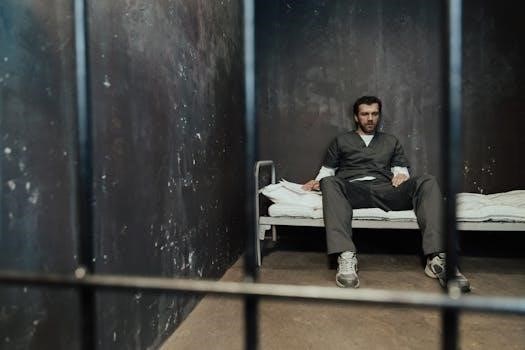
Fundamentals of the Criminal Justice Process
The criminal justice process involves a series of steps from initial investigation to final resolution. It begins with law enforcement detecting a crime‚ followed by investigation to gather evidence and identify suspects. Arrest occurs when law enforcement has probable cause to believe an individual committed a crime.
After arrest‚ the suspect is booked and informed of their rights. A preliminary hearing determines if there is sufficient evidence for a trial. If so‚ the suspect is indicted‚ formally charged with a crime. Plea bargaining may occur‚ where the defendant pleads guilty to a lesser charge.
If a plea agreement is not reached‚ the case proceeds to trial. Evidence is presented‚ and a jury or judge determines guilt or innocence. If found guilty‚ sentencing occurs‚ involving penalties such as imprisonment‚ fines‚ or probation. Appeals may follow‚ challenging the conviction or sentence; The process aims to balance public safety and individual rights.
Historical Perspective of Criminal Justice in America
The American criminal justice system evolved from English common law‚ adapting over centuries to reflect societal changes. Early colonial systems were decentralized‚ emphasizing local control and religious morality. The 19th century saw professionalization of law enforcement with the rise of municipal police forces.
Progressive Era reforms in the early 20th century aimed to address corruption and improve efficiency through scientific methods. The mid-20th century witnessed increased federal involvement in crime control due to rising crime rates and civil rights movements. Landmark Supreme Court decisions expanded due process rights for the accused.
The “get tough on crime” era of the late 20th century led to increased incarceration rates and stricter sentencing laws. Contemporary criminal justice faces challenges such as mass incarceration‚ racial disparities‚ and evolving technology. Ongoing debates focus on balancing punishment with rehabilitation and addressing systemic inequalities within the system.
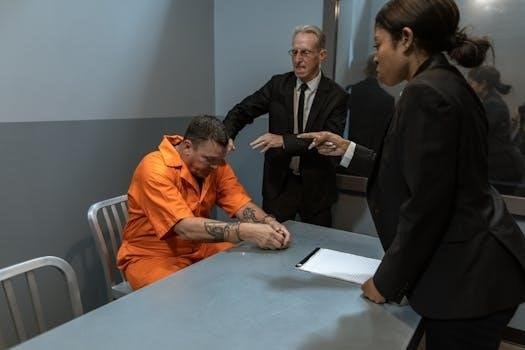
Criminology and Criminal Justice
Criminology and criminal justice are closely related but distinct fields. Criminology is the scientific study of crime‚ its causes‚ and patterns. It seeks to understand why individuals commit crimes and why crime rates vary across societies. Criminological theories inform criminal justice practices by providing insights into effective crime prevention and intervention strategies.
Criminal justice‚ on the other hand‚ focuses on the processes and institutions involved in controlling crime. This includes law enforcement‚ courts‚ and corrections. It examines the effectiveness of different policies and practices in reducing crime and ensuring justice.
Criminology provides the theoretical foundation for criminal justice‚ while criminal justice offers a practical application of criminological knowledge. Both fields contribute to a comprehensive understanding of crime and its impact on society.
Key Concepts in Criminal Law
Criminal law defines the boundaries of acceptable behavior and outlines the consequences for violating those boundaries. Several key concepts underpin criminal law‚ shaping how crimes are defined‚ prosecuted‚ and punished.
One fundamental concept is mens rea‚ or “guilty mind‚” which refers to the mental state of the offender at the time of the crime. To be convicted‚ the prosecution must prove that the defendant acted intentionally‚ knowingly‚ recklessly‚ or negligently. Another core concept is actus reus‚ the “guilty act‚” which requires proof that the defendant committed a prohibited act.
Causation is also crucial‚ establishing a direct link between the defendant’s actions and the resulting harm. Defenses‚ such as self-defense or insanity‚ can negate criminal liability. Understanding these concepts is essential for comprehending the complexities of criminal law.
Due Process Rights of the Accused
The due process rights of the accused are fundamental principles enshrined in the Constitution‚ ensuring fair treatment throughout the criminal justice system. These rights protect individuals from arbitrary government action and safeguard their liberty.
The Fourth Amendment guarantees protection against unreasonable searches and seizures‚ requiring warrants based on probable cause. The Fifth Amendment protects against self-incrimination and ensures the right to remain silent. It also guarantees due process of law‚ preventing the government from depriving individuals of life‚ liberty‚ or property without fair procedures.
The Sixth Amendment guarantees the right to counsel‚ the right to a speedy and public trial‚ and the right to confront witnesses. These rights are crucial for ensuring a fair and just criminal justice system‚ protecting the innocent and holding the guilty accountable.
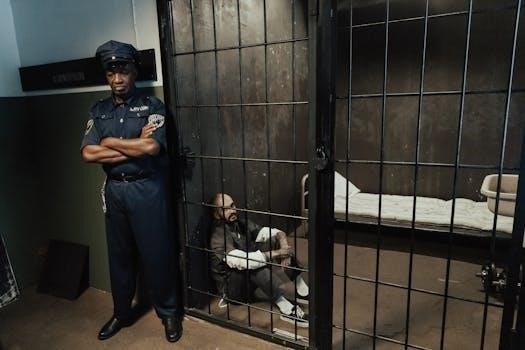
Ethical Considerations in Criminal Justice
Ethical considerations are paramount in criminal justice‚ guiding professionals in making morally sound decisions within a complex system. Law enforcement officers face ethical dilemmas in using force‚ conducting searches‚ and interacting with the public. Prosecutors encounter ethical challenges in plea bargaining‚ presenting evidence‚ and ensuring fair trials.
Defense attorneys must navigate ethical considerations in representing clients‚ maintaining confidentiality‚ and advocating for their rights. Judges grapple with ethical issues in impartiality‚ sentencing‚ and ensuring due process. Correctional officers face ethical dilemmas in maintaining order‚ ensuring inmate safety‚ and preventing abuse.
Maintaining integrity‚ honesty‚ and fairness is crucial for upholding the legitimacy and effectiveness of the criminal justice system. Ethical decision-making ensures that justice is served impartially‚ protecting the rights of all individuals involved.
